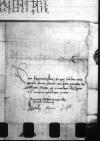List #2399
Gdańsk Town Council do Ioannes DANTISCUSGdańsk (Danzig), 1541-03-08
| odebrano Heilsberg (Lidzbark), 1541-03-14 Rękopiśmienne podstawy źródłowe:
Publikacje:
| ||||||||
Tekst + aparat krytyczny + komentarz Zwykły tekst Tekst + komentarz Tekst + aparat krytyczny
Dem Hochwirdigsten zu Goth fursten unde herren herren
Hochwirdigster in Got Furst, Genediger Herre.
Unser bereitwillige und gantz unvordrossene dinste seint Ewer Hochwirdige Gnaden in allewege bevoran entpfolen.
Genediger Herre.
Wir seint zcweisels anigk Ewer Hochwirdige Gnade werde sich ane vorhin ergangenen hendelen und beschwerden, / so der gemeine kofman, / welcher seinen handel unde wandel im
So ist es dennoch in einem ungewandelten beschwer und mehrer vor gefaster newickeit (zo wie uns der kofman berichtet) vorbliben. / Derwegen wyr vor uns mit den ersamen unsern frunden der dreyer stette
Domit aber sulch gemeyn beschwer der zcolle abgeton und durch genedige furderunge Ewer Hochwirdige Gnade geroten werden moge. Ist an Ewer Hochwirdige Gnade unser dinstlich und fleisigk b[it]ten wolle in genediger dises gemeynen obligens erwegunge an
Sulchs seint wir / ummb Ewer Hochwirdige Gnade (die wir Gote in langweriger gesuntheit und gelugseligen stande mit fleis bevelen) in allewege unserm vormogen noch / zcu vordinen guthwilligk.
Geben
Ewer Hochwirdige Genaden dinstwilige

